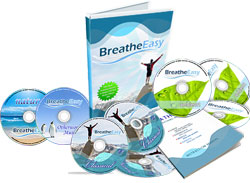In fact, deep breathing can contribute to high blood pressure, anxiety and panic attack and numerous other unhealthy conditions.

Surprise! Deep breathing does not relieve anxiety and panic or deliver any of the many health benefits claimed for it
Breathing has been used over the millenia for all types of health purposes. Gurus and martial artists have achieved incredible feats, mostly through control of their breathing.
In recent years a clinically-developed method called “slow breathing” has proved a great way to lower blood pressure naturally. Even more recently, research at the University of California, Davis, has shown a very similar technique to also be very effective at controlling anxiety and panic attack.
But if the right type of breathing can be good for health it should be evident that the “wrong” way of breathing can have unhealthy consequences. Indeed, slow breathing research reveals that many people breathe rapidly, erratically and even hold their breath at times, especially when under stress. They call this “inhibitory breathing”.
The result of inhibitory breathing is an unhealthy balance of gases in the blood that destabilizes blood chemistry and makes it acidic, a condition that leads to hypertension. Just a few minutes of “slow breathing” can reverse the process and lower blood pressure.
Control your breathing and you take control of your blood pressure!
Deep breathing is also commonly advised to control anxiety and panic attack. On the surface, this makes sense because hyperventilation is one of the most frequent and disturbing symptoms of anxiety disorders. Hyperventilation is almost identical in effect to inhibitory breathing. Rapid, uncontrolled breathing causes an excess of oxygen in the blood which can produce dizziness, nausea and shortness of breath, all of which lead to further panic and loss of control.
Breathing control, therefore, is the single most effective way to counter anxiety and panic attack.
But deep breathing, surprisingly, is not the answer. Indeed, it often worsens both the feelings and physical symptoms of anxiety!
This is because deep breathing, as commonly understood and practiced, actually results in hyperventilation! Watch people “deep breathing” and you will often see them huffing and puffing like the old steam engine that couldn’t. You’ll see them taking a massive, long and deep breath until they nearly turn blue and then let loose with an explosive blast of an exhale.
Okay, that may be a slight exaggeration but you get the picture. People tend to misconceive deep breathing; even the word “deep” in this usage is misplaced and misleading. This may have come about because we’ve been told by natural health gurus that we need to practice deep breathing because we’re deficient in oxygen.
That’s total nonsense. In fact, we are normally saturated with oxygen and the only thing deep breathing does is to flush carbon dioxide out of the system, which produces hyperventilation. Plus, the resulting excess acidity of our blood chemistry raises heart rate and blood pressure and perpetuates the ill feelings and desperation of panic attack. Some way to control anxiety!
A different type of breathing exercise, however, is extremely effective at lowering blood pressure, controlling anxiety disorders and much more. In the University of California study, anxiety sufferers wore devices that measured their carbon dioxide levels during breathing exercises. This allowed them to avoid over-breathing and hyperventilation:
The goal of these exercises is to reduce chronic and acute hyperventilation and associated physical symptoms. This is achieved by breathing slower but most importantly more shallowly. Contrary to lay belief, taking deep breaths actually worsens hyperventilation and symptoms.
Breathing slowly, smoothly and shallowly is the key to healthy breathing with lower blood pressure, relief of stress, better sleeping, control of anxiety and much more. Watch an experienced meditator and instead of the fluster and bluser of deep breathing you can barely notice the gentle ebb and flow of slow and healthy breathing.
This type of breathing – slow, controlled and shallow – is also called the Buteyko Method when applied to control of asthma. Buteyko breathing was developed by a doctor in Russia in response to the ineffective methods of treating asthma that were in use at that time.
Asthma attacks make sufferers feel as if they are not getting enough air. The result is usually frantic breathing and hyperventilation accompanied by feelings of panic. But Dr. Buteyko noticed that, far from not getting enough oxygen, asthma sufferers were making themselves CO2 deficient through overbreathing. He discovered that you could relieve asthma much more effectively by breathing less… by breathing more shallowly.
Control your breathing and you prevent asthma attacks!
Of course this is exactly the same as what happens during anxiety and panic and the solution is the same as well. The Buteyko method has since become a success for millions of asthma sufferers while slow breathing has helped to relieve countless cases of high blood pressure.
Learning slow breathing, in fact, can often be the complete and final remedy to anxiety disorders. It used to be thought that the condition arose from deep-seated psychological issues. Breathing control, so it was said, may help relieve the symptoms but only intensive cognitive therapy could uncover the deeper causes of anxiety.
But we now know that “talking therapies” often lead nowhere and are totally ineffectual at relieving the terrifying symptoms of panic attack. It may well be – just as with high blood pressure - that “inhibitory breathing” is the cause of the anxiety disorder, not some elusive psychological trauma.
As a matter of fact, medical experts at the University of California noted that anxiety patients showed abnormal responses to changes in blood acidity, a factor directly related to their manner of breathing.
So it’s not at all a stretch to say hyperventilation/inhibitory breathing is both cause and symptom of anxiety disorder.


 A unique method of blood pressure control: The BreatheEasy Sytem
A unique method of blood pressure control: The BreatheEasy Sytem